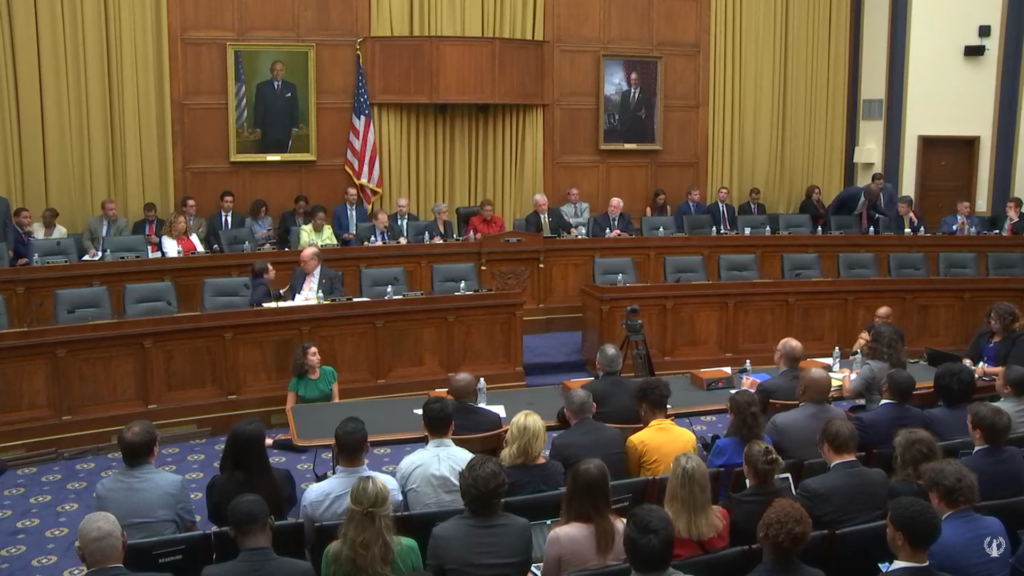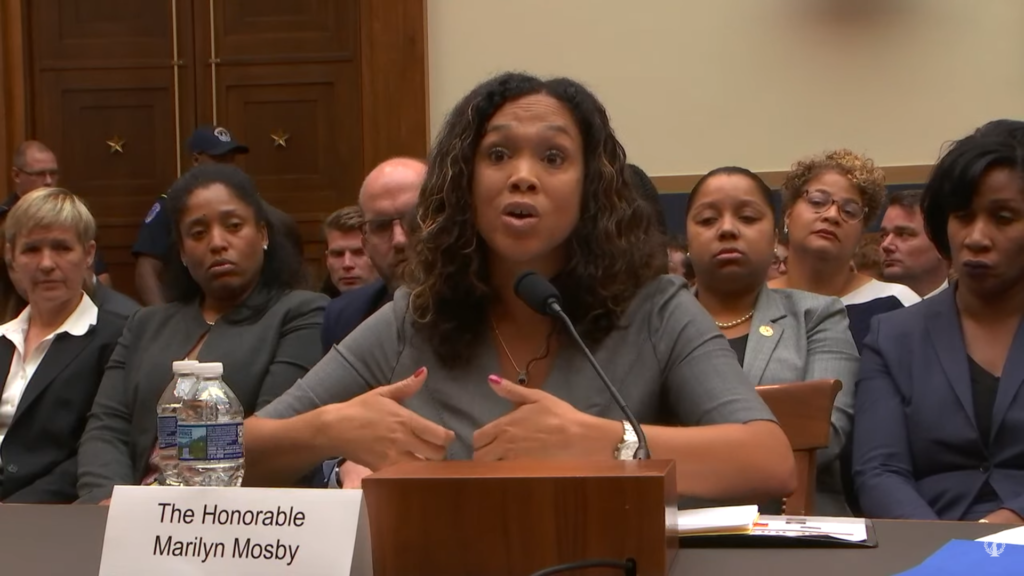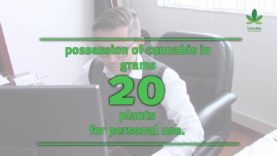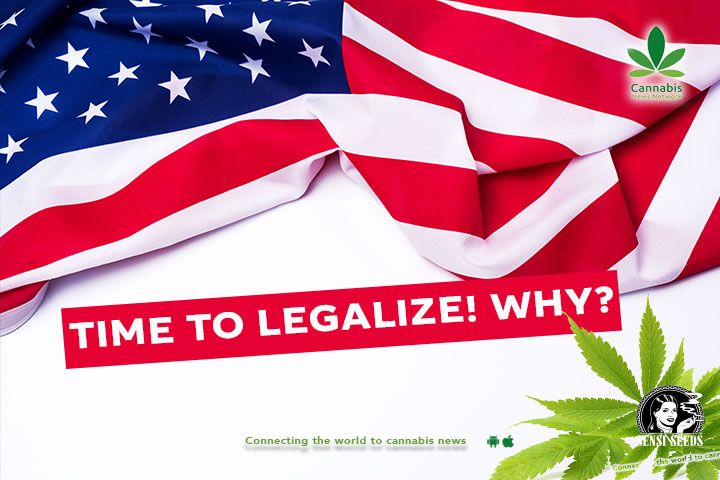
Historic cannabis hearing in the USA, regulation works better than prohibition. Must watch!
The House Subcommittee on Crime, Terrorism, and Homeland Security heard testimony Wednesday about the impacts of US marijuana prohibition on American lives and freedoms, as well as the necessary road ahead to protect them. Legal, health, and industry experts addressed members of Congress about the known social benefits of legalization, the massive marijuana arrest rates that continue in the US, and the need to remove marijuana from the Controlled Substances Act as quickly as possible.
Time to legalize! Why?
- “Ending cannabis prohibition and restoring the communities devastated by the war on drugs”
- “64 % of the people in the USA are in favor of legalization”
- “Cannabis prohibition enforcement disproportionately impacts communities and people of collar”
- “Nationally, the Marijuana Business Daily’s Annual Fact Book estimates state-legal cannabis sales will exceed $12 billion in 2019. It also estimates the state-legal cannabis industry currently employs the equivalent of 175.000 to 215.000 full-time workers”
- “Economic gains associated with this new industry go to a select few. An effective “whitewashing” of cannabis history”
- “Black people are almost four times more likely to be arrested for marijuana possession in the United states”
- “Decriminalization of marijuana which should include the removal of marijuana from the schedule of controlled Substances Act.”
- “As physicians, we believe the cannabis should never have been made illegal for consenting adults. It is less harmful to adults than alcohol and tobacco, and the prohibition has done more damage to our society than the adult use of cannabis itself”
Expert Witnesses:
- David L. Nathan , MD, DFAPA
- Mr. Neal Levine, CEO of the cannabis trade Federation
- Malik Burnett, MD MBA MPH
- Marilyn Mosby Esq. State’s Attorney for Baltimore City
Marijuana Laws in America
In honor of the historic hearing, entitled “Marijuana Laws in America: Racial Justice and the Need for Reform,” drug reform advocates announced their formation of a coalition aimed “to advocate for federal marijuana reform through a racial justice lens.”
Groups that have signed on for the new Marijuana Justice Coalition include the ACLU, Center for American Progress, Center for Law and Social Policy, Drug Policy Alliance, Human Rights Watch, Immigrant Legal Resource Center, Lawyers’ Committee for Civil Rights Under Law, Leadership Conference on Civil & Human Rights, NORML, and Students for Sensible Drug Policy.
“This coalition was formed with the goal of reforming federal marijuana laws, but doing so in a way that gives back to the communities most impacted by the war on drugs,” said Queen Adesuyi, Policy Coordinator at the Drug Policy Alliance’s Office of National Affairs, in a statement. “Black and brown people have been traumatized by our racist marijuana laws and, as the federal government embraces reform, our groups will make sure that any proposal will repair the damage done to those communities.”
As House Judiciary Committee Chairman Rep. Jerrold Nadler (D-NY) emphasized during his opening remarks, “For those saddled with a criminal [marijuana] conviction, it can be difficult or impossible to vote, to obtain educational loans, to get a job, to maintain a professional license, to secure housing, to receive government assistance, or even to adopt a child.”
The hearing
The hearing itself demonstrated the need for lawmakers to pursue meaningful learning on the topics of marijuana reform, racial justice, and their significant overlap—as well as the wealth of knowledge that reform advocates and experts can provide if asked.
In his opening remarks, Rep. Tom McClintock (R-CA) stated that marijuana reform is one of few topics that our current, often heavily divided Congress could potentially agree on during this congressional session, but also that the House majority (or perhaps a majority of reform proponents) chose to “play the race card” in this matter to stoke racial or social division.
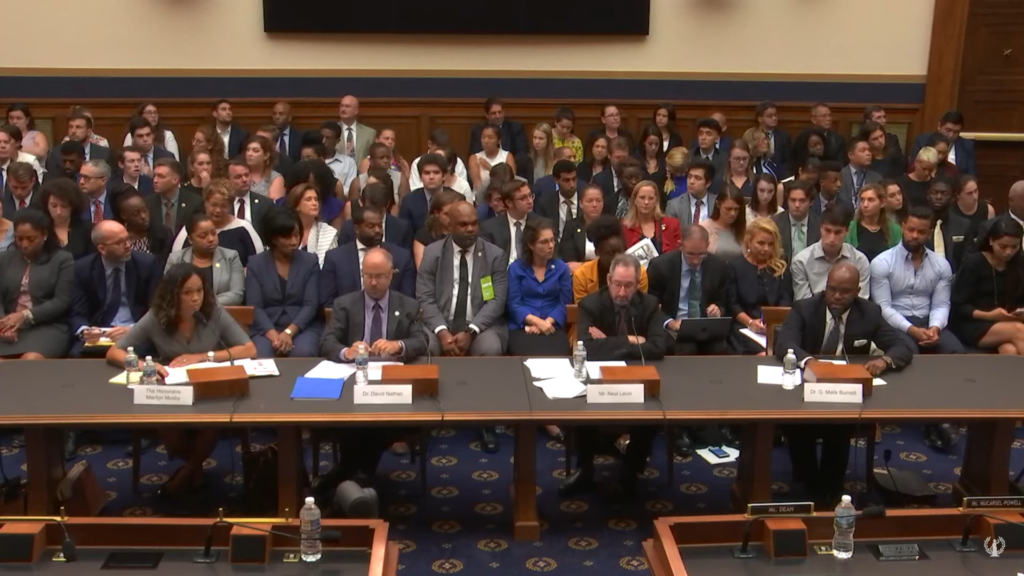
Thankfully, members of the expert panel were on hand to gracefully but firmly push back on McClintock’s bizarre and disrespectful assertion, which seemed to disregard decades’ worth of data showing that—among other things—Americans of color are arrested and incarcerated for marijuana crimes at several times the rate of white ones, despite similar usage rates, and with even longer-lasting, truly devastating effects.
“Whole communities are being ravaged,” said Baltimore State’s Attorney Marilyn Mosby during her testimony. Mosby also reminded those present that marijuana laws are “racist and discriminatory in their implementation.”
Dr. G. Malik Burnett, MBA, MPH described the current state of US cannabis (with complete accuracy) as “a tale of two Americas:” in short, one where wealthy white men are starting successful cannabis businesses with few hurdles and plenty of help, and where Americans of color who simply use the plant are still having their freedom and livelihoods taken away.
The Marijuana Justice Coalition’s set of principles are as follows:
• Descheduling marijuana, as maintaining marijuana on the Controlled Substances Act serves to preserve federal criminalization and enforcement.
• Criminal justice reform provisions (e.g. expungement, resentencing).
• Provisions eliminating barriers to access to public benefits (e.g. nutrition assistance, public housing, etc.) and other collateral consequences related to an individual’s marijuana use or previous arrest or conviction.
• Provisions eliminating unnecessarily discriminatory elements for marijuana use, arrests, and convictions, including drug testing for public benefits or marijuana use as a reason for separating children from their biological families in the child welfare system.
• Provisions that ensure that marijuana use or participation in the marijuana industry does not impact the immigration status of noncitizens nor their ability to naturalize.
• Marijuana tax revenue be directed to local units of government and community-based organizations to reinvest in individuals and communities most impacted by the war on drugs, particularly through programming that helps eliminate the collateral harms of marijuana prohibition, especially for individuals with systemic and structural barriers to employment and/or living in high-poverty communities.
• Marijuana tax revenue be directed to support entrepreneurs from communities directly impacted by the war on drugs with a process to provide them with the requisite capital to develop cannabis businesses and encourage emerging licensing programs to be inclusive and reflective of their communities.
Written by Janet Burns – source: https://www.forbes.com
Interesting links:
- https://judiciary.house.gov/legislation/hearings/marijuana-laws-america-racial-justice-and-need-reform
- https://www.cnbc.com/2019/07/10/us-lawmakers-look-to-legalize-pot-in-historic-marijuana-reform-hearing.html?__source=sharebar%7Ctwitter&par=sharebar
- https://www.forbes.com/sites/janetwburns/2019/07/10/as-congress-hears-cannabis-testimony-advocates-form-powerful-coalition/#3bcf8a581610https://youtu.be/MYfE7j0wBMs


